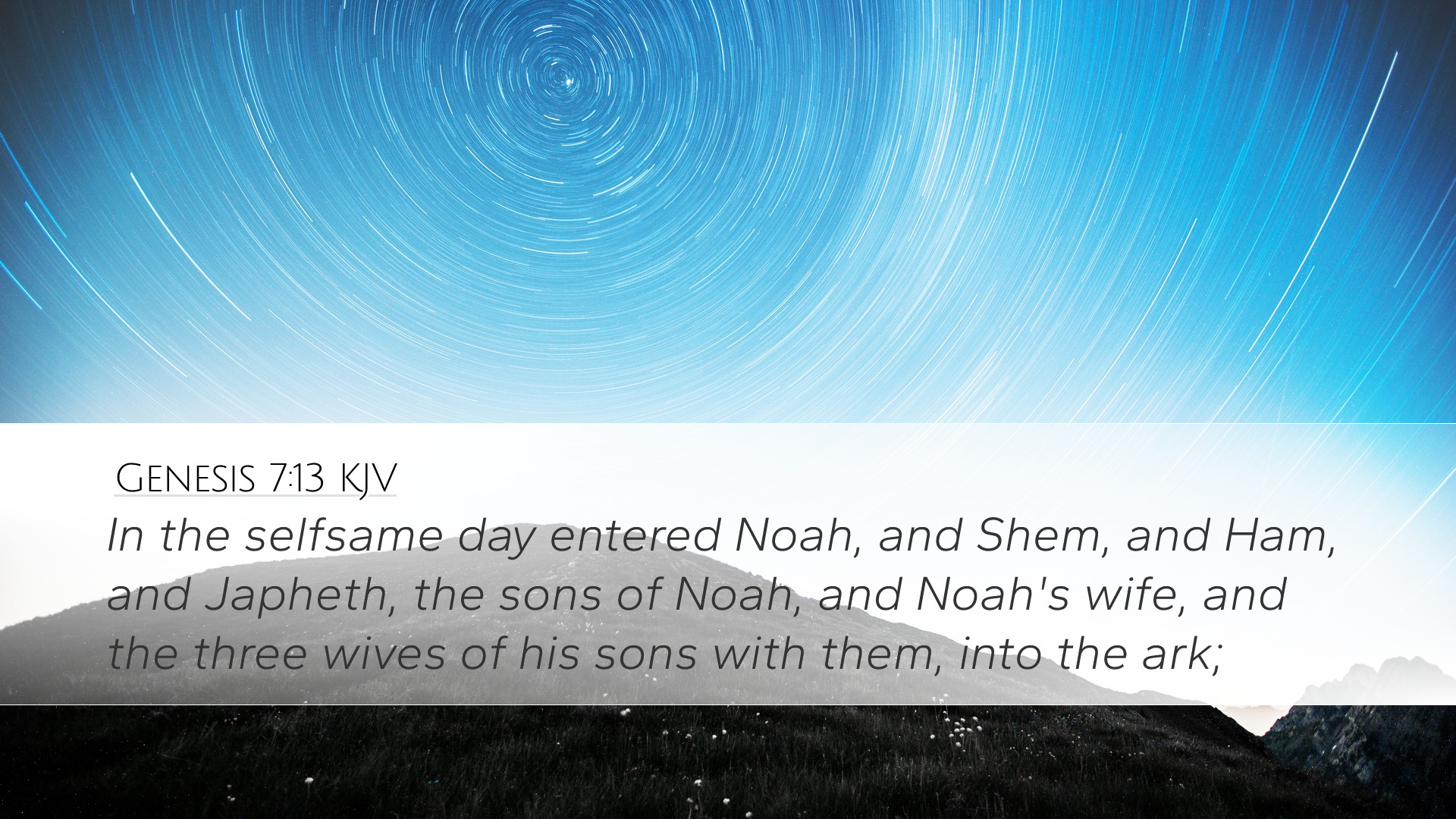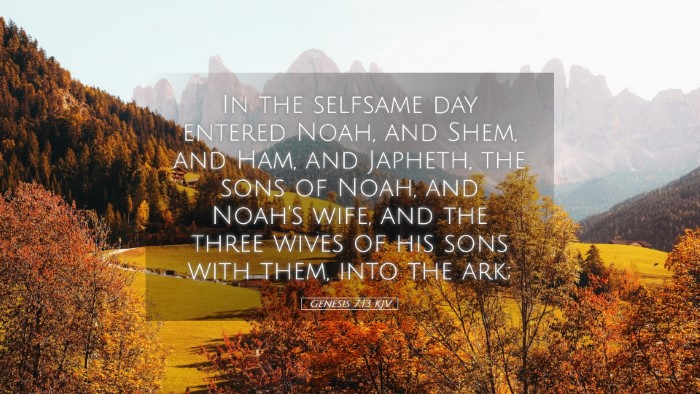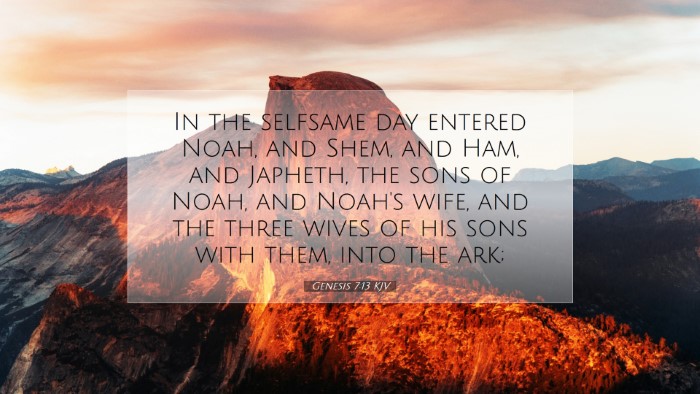Commentary on Genesis 7:13
Verse: "In the selfsame day entered Noah, and Shem, and Ham, and Japheth, the sons of Noah, and Noah's wife, and his three sons' wives with them, into the ark."
Introduction
The verse Genesis 7:13 marks a pivotal moment in the biblical narrative, encapsulating the fulfillment of God's command regarding Noah's Ark. This event reflects profound themes of obedience, divine judgment, and salvation. Herein, we weave together insights from public domain commentaries by Matthew Henry, Albert Barnes, and Adam Clarke, aiming to enrich the understanding of pastors, students, theologians, and scholars.
Contextual Setting
In the broader narrative of Genesis, the Flood serves as a significant act of divine judgment against a corrupt world. Leading up to this event, the text details God's sorrow over humanity's wickedness, which ultimately leads to His decree to cleanse the earth. The ark symbolizes both judgment and salvation, serving as a vessel that preserves life amidst destruction.
Insights from Public Domain Commentaries
Matthew Henry's Commentary
Matthew Henry emphasizes the obedience of Noah and his family. He points out that their entering the ark “on the selfsame day” illustrates a critical moment of divine protection. Henry notes that the timing of their entrance signifies God's perfect timing and the urgency of obedience to His commands. The phrase reminds believers of the importance of responding promptly to God's call in their lives.
Henry also reflects on the typology present in this passage, noting how Noah and his family represent the faithful remnant amidst a world destined for judgment. This portrayal serves as an encouragement to believers to remain steadfast and righteous, even in the face of widespread corruption.
Albert Barnes' Commentary
Albert Barnes provides a detailed analysis of the characters involved, specifically highlighting the importance of Noah's sons and their wives. He points out that their collective entrance into the ark demonstrates familial unity and obedience to divine direction. Barnes also notes the signification of their names in relation to their roles throughout the narrative, emphasizing how God preserves lineage through Noah's family to repopulate the earth post-flood.
Moreover, Barnes remarks upon the divine sovereignty displayed in this passage, illustrating that it is God’s will that governs the events leading to the Flood. He interprets the assembly of Noah’s family as reflective of a covenantal relationship where God preserves those who are faithful, showing that even in times of judgment, His mercy is evident.
Adam Clarke's Commentary
Adam Clarke offers a comprehensive understanding of the ark itself, viewing it as a profound symbol of salvation. He elaborates on the design and structure of the ark, emphasizing its significance in ensuring the survival of Noah and his family. Clarke argues that the ark is a typological precursor to Christ, where safety is found and life is preserved through faith.
Clarke also highlights the emotional and spiritual aspects of their faith as they entered the ark, suggesting that Noah's family must have experienced a mixture of fear and faith. Their obedience, Clarke posits, stands as a testament to trusting in God’s promises, even amidst uncertainty and the unknown, which resonates deeply with believers facing their trials today.
Theological Reflections
- The Sovereignty of God: This verse depicts the sovereignty of God in controlling the events of history and fulfilling His promises.
- Obedience and Faith: The act of entering the ark serves as a model of obedience and faith, encouraging believers to heed God's call in their lives.
- Salvation Through Judgment: The ark represents the dual themes of salvation and judgment, central to the narrative of humanity's relationship with God.
- The Faithful Remnant: Noah's family signifies the faithful remnant, preserving the lineage through which God's promises will continue.
Application for Today
In considering Genesis 7:13, modern readers can derive valuable applications that transcend time and cultural barriers. Pastors can draw from the narrative to encourage congregations towards obedience in their personal lives, drawing parallels between Noah’s obedience and contemporary calls to faithfulness.
Students and scholars may explore the rich typology within the account, engaging with themes of salvation history as they connect the ark with the overarching narrative of Scripture, culminating in Christ. The metaphor of entering the ark can symbolize the believer's journey into salvation and the importance of community in faith.
Conclusion
Genesis 7:13 serves as a profound reminder of God's faithfulness to His people amid judgment. The combined insights of Matthew Henry, Albert Barnes, and Adam Clarke enrich this understanding, providing a tapestry of theological reflection, practical application, and encouragement for all believers. As we contemplate this passage, let us embrace the call to enter into a deeper relationship with God, confident in His promises and dedicated to living out our faith every day.


